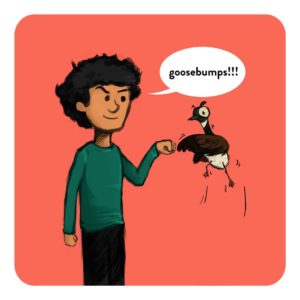Watch a horror movie alone in a dark room; you will experience an unpredicted cold breeze, almost stumbling over your own feet. This spine chilling experience will result in Goosebumps.
Goosebumps ÔÇô sometimes called goose flesh or goose pimples can make your skin to crawl. It has become so associated with fear that the word is synonymous with thrills and chills.
But have you ever thought what exactly Goosebumps are and what on earth causes them? This bizarre needs to be understood via a scientific approach.
After doing research I found that scientists have a good understanding of what goosebumps are, but why they happen is still a bit of a mystery.
Overview of the process:
Anyone who ever had ÔÇ£the chillsÔÇØ can immediately recognize the signs of goosebumps but the symptoms fade so fast that one questions himself, what actually happened?┬á In your body when the emotional rate is high adrenaline stimulates tiny muscles to pull on the roots of your hairs, making them stand out from your skin. That distorts the skin, causing bumps to form. This is the physiological explanation for goosebumps; now let us understand it in more elaborative form.
Goosebumps from a medical perspective:
In the medical terms, goosebumps are also known as piloerection, cutis anserina, and horripilation. You may have observed that you start to have goosebumps when you feel extremely cold or when you are juggling between strong emotional feelings like extreme fear, sadness, joy, and sexual arousal.
 It appears due to a reflex nervous system response called the pilomotor reflex. This spontaneous response occurs in your body when hair follicles are stimulated by specific nerves in the skin, which triggers contraction of tiny muscle cells called arrector pili at the base of the hair follicles. Thereafter contraction of these muscle cells slightly elevates the hair follicle and causes the hair to stand up from the skin surface.
It appears due to a reflex nervous system response called the pilomotor reflex. This spontaneous response occurs in your body when hair follicles are stimulated by specific nerves in the skin, which triggers contraction of tiny muscle cells called arrector pili at the base of the hair follicles. Thereafter contraction of these muscle cells slightly elevates the hair follicle and causes the hair to stand up from the skin surface.
What Is Your Body Telling You When You Get Goose Bumps?
Mostly goosebumps are nothing more than a temporary nuisance. However, they can be a symbol of a serious medical condition. Some of the conditions are described below:
- Chills or Fever: DonÔÇÖt take goosebumps on a lighter note as sometimes they may give you signs related to influenza.
- Keratosis pilaris: If you observe goosebumps for longer period consult your dermatologist as it may be a symptom of Keratosis pilaris.
- Autonomic dysreflexia: Sometimes overreaction can result in goosebumps. Autonomic dysreflexia is an overreaction of the nervous system caused by a spinal cord injury. This disorder causes sudden episodes of extremely high blood pressure, typically accompanied by headaches, sweating, facial flushing, anxiety and goosebumps.
- Juggling between Emotional Waves: Heavy, intense emotions often trigger a wave of goosebumps. Sexual arousal also brings on goosebumps in some people. Practically any strong emotion can potentially stimulate the pilomotor reflex, including love, joy, admiration, anger, disgust and sadness.
Goosebumps in Animals:
 Goosebumps are not limited to human beings only, in fact some animals like porcupines and dogs also experience goosebumps. In their cases, goosebumps are a bodily response to situations where itÔÇÖs advantageous to appear larger and stronger, such as during a confrontation or courtship. E.g. when porcupines are threatened, their quills raise in a reflex action. Similarly, you may have seen a cat’s or a dog’s hairs stand on end when they sense danger or feel afraid.
Goosebumps are not limited to human beings only, in fact some animals like porcupines and dogs also experience goosebumps. In their cases, goosebumps are a bodily response to situations where itÔÇÖs advantageous to appear larger and stronger, such as during a confrontation or courtship. E.g. when porcupines are threatened, their quills raise in a reflex action. Similarly, you may have seen a cat’s or a dog’s hairs stand on end when they sense danger or feel afraid.
#DidYouKnow
- The term ÔÇ£goosebumpsÔÇØ comes from the way a personÔÇÖs skin looks when they form: like a plucked goose.
- Animals get goosebumps to stay warm? Animals with thick coats of fur get cold; the hair rises and creates insulation to retain heat.
- Some people get goosebumps when they listen to music? Have you ever got goosebumps when you favorite singer hits the high notes?
- A person who is going through recovery from drug addiction may often experience goosebumps and a term used for them is ÔÇ£cold turkey.ÔÇØ
So, what gives you goosebumps? Share with us in the comment section below.


I get goosebumps when I see a beautiful dance performance.